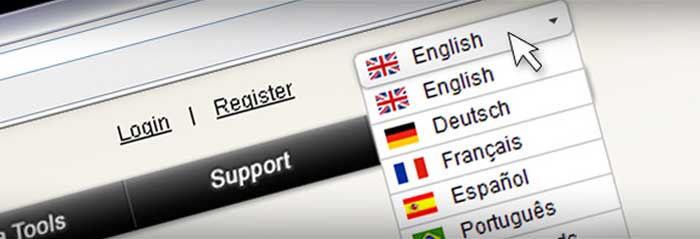
How to Translate your Website
When did people start to realise the importance of website localisation? As we enter the age of ‘WEB 2.0’, the internet has become an even more important platform for companies to promote their new products and services. How to translate your website? If you follow these tips you could reach many millions of potential new customers.
Many international companies would have multi-lingual websites. These websites are normally designed and built by their own IT departments within their companies, and then simply have the content translated into various target languages by professional translators. However, when those international companies are officially taking their products into the target countries, suddenly they realise that because of the different
culture and rules relating website usage, merely a professional translation service cannot satisfy the requirement of their campaigns. More importantly, the website needs to be localised from many different aspects, such as brand names, website design, navigation pane customizer and re-editing information pages etc, so as to adapt to the requirements of the local customers in terms of reading, browsing or marketing development etc.
The importance of localising your website during the translation process should not be underestimated
If you are looking to get your website translated, you need to make sure that your translation company can provide more than just professional native translators. The company must also have extensive knowledge of the market of the target countries, native designers and website developers. Such company can provide you with one-stop all-inclusive services. Below you will find a few tips for the localisation of your website:

Localise the content of your website. When introducing your product to a target country, it is very important to localise the necessary information on your website. It is not essential to convert all information into the target language, what you must consider is the target culture and your targeted consumers. Would your potential customers like to read a large amount of information in order to get basic understanding of your products, or would they rather obtain such information from images, or images with short descriptions? If your website contains a lot of technical terminologies, you can also consider using simpler terms to replace the jargon.

Customise your navigation pane. The design of your website needs to match the expectation of your readers. Not every language reads from the left to right: Arabic web users read from right to left, readers in China would expect to see vertical navigation panes.

Search Engine Optimisation. This is very important in order to effectively market your new product in a brand new market. The fact is, in a lot of countries Google and yahoo are not the No 1 search engine. For example, in China Baidu.com has 80% of the market share. Apart from making your products seen in those search engines, you will also need to consider what people are likely to search for in the target countries.

Cultural background will determine the things we do, think, speak and read. Websites are also restricted to cultural influences. Website localisation could greatly contribute to the development of your business. The above mentioned are merely the tip of the iceberg.
As the number of internet users is constantly growing, website localisation is more important than ever for companies involved in international trade.
Here at Global Village Translation, we have the skill, experience and local knowledge to accurately translate your website and expertly localise it and open it up to millions of potential new readers and customers.
We have only discussed part of the essential factors. If you have any questions in terms of website translation or website localisation, please feel free to contact us for free consultation.





0 comments
Leave a comment
Want to express your opinion?
Leave a reply!